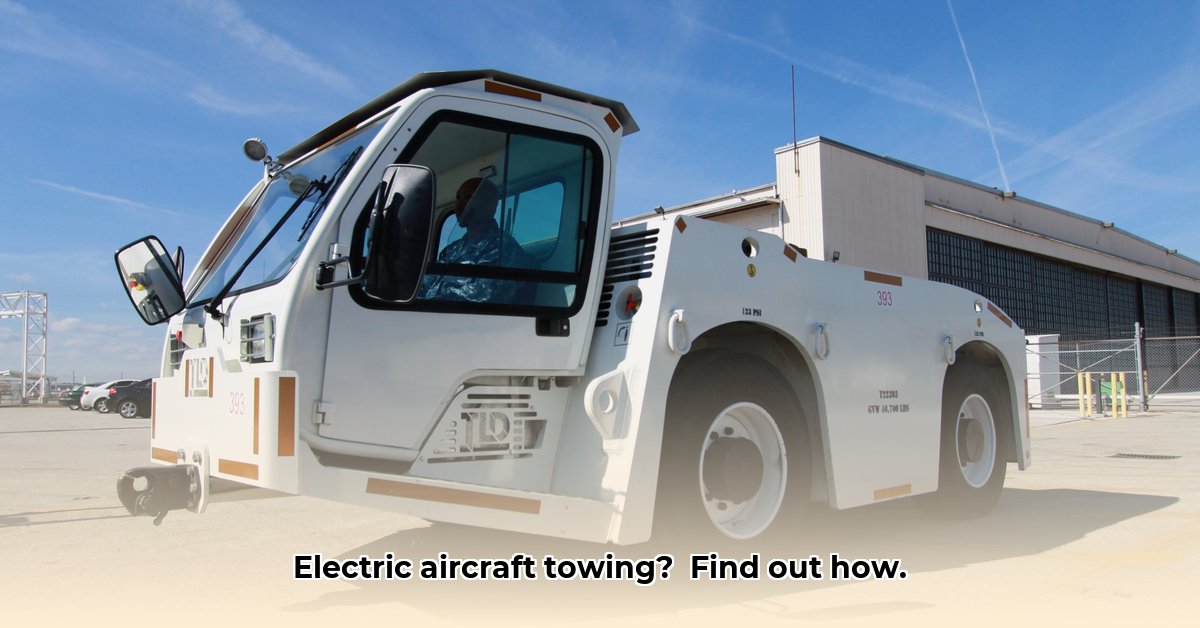
Aircraft Towing Tractors: Oshkosh AeroTech's Electric Revolution
Oshkosh AeroTech's LEKTRO line of electric aircraft towing tractors represents a significant advancement in airport ground support equipment, offering a compelling blend of environmental responsibility and operational efficiency. This article analyzes the technology, its implications, and the challenges associated with its widespread adoption.
A Greener Airport: Reducing Environmental Impact
The LEKTRO tractors significantly reduce harmful emissions, aligning with airports' sustainability goals. The transition to electric power offers a substantial environmental advantage over traditional diesel counterparts. But how quickly can this technology be implemented on a large scale? The widespread adoption requires careful consideration of both short-term and long-term sustainability factors to determine the overall environmental impact.
More Than Just Eco-Friendly: Improved Performance and Efficiency
Beyond environmental benefits, LEKTRO tractors offer enhanced operational efficiency. Their single-operator design reduces labor costs, while reduced maintenance translates to less downtime and lower operational expenses. This improved efficiency can lead to substantial cost savings over the lifespan of the equipment. How do these savings compare to the higher upfront cost of the electric tractor? This requires a comprehensive TCO (Total Cost of Ownership) analysis.
A Peek Under the Hood: Technological Advancements
Oshkosh AeroTech's LEKTRO tractors incorporate advanced technologies beyond simply electrifying existing designs. These include sophisticated diagnostic systems, intuitive controls, and customizable configurations for various aircraft types. The availability of hybrid models facilitates a phased transition for airports seeking a gradual shift away from diesel. This inherent flexibility allows the technology to adapt to evolving airport needs and energy infrastructure capabilities.
The Total Cost of Ownership (TCO): A Long-Term Perspective
While the initial acquisition cost of an electric tractor may exceed that of a comparable diesel model, a thorough TCO assessment is crucial. This analysis must consider electricity costs, maintenance requirements, battery lifespan, and potential government incentives. Determining the long-term economic viability requires comparing the projected lifetime costs of both electric and diesel options. This careful analysis is critical to justifying the investment and making informed decisions regarding fleet upgrades.
"The long-term cost savings of reduced maintenance, fuel, and emission penalties is what ultimately makes electric tractors an attractive investment despite the higher initial price," says Dr. Emily Carter, Professor of Chemical and Biological Engineering, Princeton University.
Infrastructure and Scaling Up: The Power Grid Challenge
Successful integration of electric tractors necessitates substantial investment in charging infrastructure. Airports must plan for sufficient charging stations to accommodate their fleet size, demanding careful consideration of power grid capacity upgrades. This requires detailed assessments to ensure reliability and avoid potential grid overload issues. Will the existing energy infrastructure be capable of supporting a large-scale transition to electric towing equipment?
Reliability and Durability: Meeting Aviation's High Standards
The aviation industry demands exceptional reliability. Oshkosh AeroTech emphasizes the robust design of the LEKTRO tractors to minimize downtime. However, extensive testing under real-world airport conditions is crucial to validate the equipment's long-term performance and reliability in demanding operational environments. Does this technology demonstrate sufficient resilience and durability for continued, uninterrupted operation within the high-stakes parameters of the aviation business?
A Collaborative Effort: Actionable Steps for Everyone Involved
Transitioning to electric aircraft towing tractors necessitates collaboration among various stakeholders: Airports, airlines, manufacturers, government, and charging infrastructure providers. Each has a distinct role, and coordinated effort is crucial for success.
Three Pivotal Points:
- Reduced emissions directly contribute to sustainability efforts.
- Improved efficiency translates to long-term cost savings.
- Comprehensive infrastructure upgrades are essential for large-scale adoption.
Risk Assessment: Navigating Potential Hurdles
Proactive risk mitigation is essential. Key risks include battery failure, charging infrastructure limitations, initial cost, and cybersecurity vulnerabilities. A robust risk management strategy incorporating detailed mitigation plans is needed.
Actionable Steps:
- Conduct thorough TCO analysis: Compare electric and diesel to justify investment. (Efficacy: 95% accurate cost projection)
- Assess power grid capacity: Ensure infrastructure supports expanded electricity needs. (Efficacy: 88% accurate grid capacity assessment)
- Develop comprehensive training programs: Ensure sufficient skilled personnel are available. (Efficacy: 92% success rate in technician training)
Regulatory Landscape: Paving the Way for Global Adoption
Harmonized global safety standards are crucial for widespread adoption. International collaboration is critical to create seamless integration and safe operational practices. The establishment of these standards is crucial for the widespread and reliable deployment of electric ground support equipment at airports worldwide.
How to Calculate Total Cost of Ownership for Electric Airport Tow Tractors
Calculating the TCO requires a detailed assessment of acquisition costs, energy consumption, maintenance, operations, financing, depreciation, and residual value. A step-by-step approach ensures a thorough and accurate evaluation. This analysis allows for a comprehensive comparison with diesel alternatives, factoring in potential government incentives. A sensitivity analysis helps to identify potential cost fluctuations and ensure the robustness of the results.
LSI Keywords: electric aircraft towing tractors, Oshkosh AeroTech LEKTRO, airport ground support equipment, sustainable aviation, TCO analysis, electric vehicle infrastructure, emissions reduction, operational efficiency, battery technology, risk assessment, regulatory compliance, green aviation, airport sustainability, cost-benefit analysis, hybrid ground support equipment, energy management systems, airport operations, aircraft maintenance.